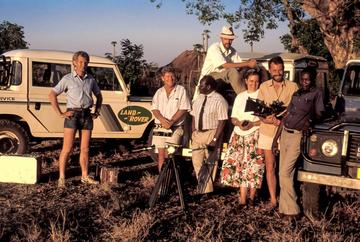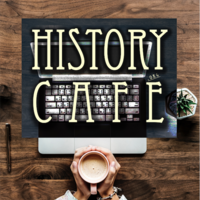History Careers - from TV to Teaching
Historians are good at getting a large amount of material together, sorting it out, finding and writing the story. Knowing how communities and institutions work is invaluable for making TV.
Jon Rosebank attended his local state grammar school before graduating from New College, Oxford with a BA in Modern History.
Career Summary
New College, 1977-85, BA Modern History, D.Phil, Junior Research Fellow
BBC and independent TV 1985-1999, writer, director and executive producer, making documentaries for BBC and C4
History teacher (years 7-13) 1999-2009, becoming Head of History 2002
Now freelance TV and writing
History Café podcast (on all the usual platforms)
Latest publication - 2021 Partisan Politics. Looking for consensus in 18th century towns (Exeter University Press, publ 17 June)
Advice to my younger self: ‘Just do enough and a bit more.’
I came up from a large state grammar school, where I was the only student to make it to Oxbridge that year. After graduating I stayed on to do research and then became a research fellow for three years, completing my doctorate. More than 30 years later my thesis is now finally making it into print. (Moral - never throw away your old notes!)

I then joined the BBC as a researcher in what was then the History and Archaeology Unit. Within three years I was making my own documentaries for BBC-2. In four I was in Malawi, as you can see in the pic, using everything I'd learned to do as an historian to understand, write and direct a documentary about African history. I'm the one in the hat, sitting on the Land Rover. What a privilege to bring an African story from 1915 to 2 million British viewers and who knows how many more around the world. I eventually became an Executive Producer before going freelance as a director.
The BBC had various formal application routes, but hardly anyone I knew took them. We all got in to television because we happened to hear that a production was looking for a researcher or a runner. Other people got in by becoming secretaries or clerks.
I imagine some will believe that you need media qualifications to get into TV. Actually, many productions avoid people with media qualifications since media teaching can often be out of touch. (Unless, that is, you want to do something technical like be a picture editor.) I've met plenty of other people who believed they could get in by presenting their own ideas for series they could make. It's a non-starter. From outside the industry you will have no idea what's needed, how to make things in the way they want them, and who their preferred suppliers are. Making your own student films helps you look committed, but don't expect an experienced professional to take your amateur work seriously. All that said, knowing how to use a professional quality camera well can be a plus since - in documentaries anyway - most researchers and assistant producers are now expected to shoot a lot of their own material. You should certainly know how to shoot stills and video with a good SLR.
It's much more important to be a highly self-starting person with plenty of hinterland - someone with loads of energy who is curious about everything, always finds solutions rather than problems, and just gets things done. Historians are good at getting a large amount of material together, sorting it out, finding and writing the story. Knowing how communities and institutions work is invaluable for making TV. But be aware that many TV people are these days wary of Oxbridge graduates. You'll need to show you have plenty of useful real-world experience (and a social media profile to prove it.) A serious expertise of some kind - especially a near-fluent language - can really help. I was lucky that I got to hear of a production that needed an historian.
These days most people get into TV by working for independent companies. Here too you just have to start at the bottom, impress everyone with your ability to get things done, and work your way up. You have to start by getting your foot in the door. Just leaving a CV, or a link to your student films, won't do. Remember, they want people who can find out and sort things for themselves. So watch plenty of TV, decide what you like, look up the people who make it, find out what else they do, work out what you can offer, and then go see them. Remember that TV is highly segmented. If you want to go into drama, or current affairs, or studio shows, or any other genre, you need to find the companies who specialise in your area. Then you need the luck to be there on the right day. Oh, and expect to have to do some work for nothing at first. Sorry about that.
Expect to work extremely hard in TV. Once I had young children, and a wife who had a big job, I took a break from TV and became a school teacher (which is also extremely hard work, but had holidays.) After a couple of years, I was a Head of History.
The routes in here are obvious. You can get a PGCE or you can get a job in an independent school and then get a teaching qualification. Whichever, you must get a teaching qualification if you want to do the job properly and progress. The one thing I'd add is that the best teachers I met had almost always done something else since university, and preferably for a number of years. It gives you essential perspective and skills in organisation and thinking outside the box. There's also no substitute for being extremely good at your subject and passionate about it.
If you are happy to work in the private sector, you will need to offer other skills besides your subject(s) - sports, music, photography, drama, whatever. If you work in the maintained sector you will need to be tough - not so much to deal with students as with the bureaucracy and frustrations of examination boards. I had a friend who quit teaching every six years in order to get his life back. I went back to TV (as a freelance director/edit producer) after 10.

Now I make podcasts, the History Cafe being my current project, and I've gone back to doing a little academic history. I guess the take-away here is that hardly anyone now works in one career all their life. My own children have changed careers, as I did, in their twenties and that seems to be a common pattern. Many of my own contemporaries changed careers again in their late 30s or early 40s. Some moved on again later. The key to that is doing your homework, maintaining a wide range of contacts and seizing the opportunities when they come.
Jon Rosebank
May 2021




